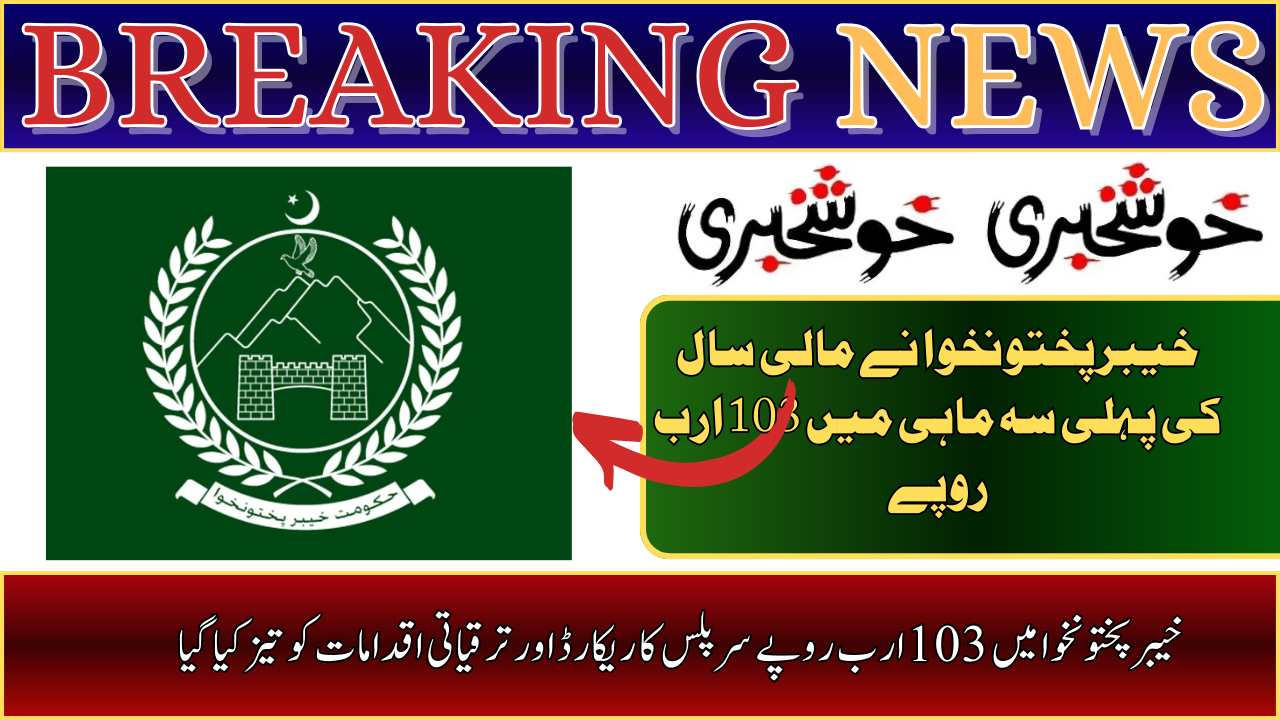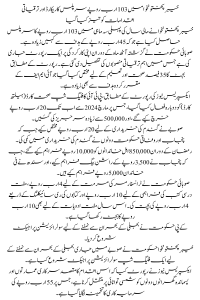Khyber Pakhtunkhwa Records Rs103 Billion Surplus
Khyber Pakhtunkhwa (K-P) has reported a fiscal surplus of Rs103 billion in the first quarter of the current fiscal year, significantly exceeding the initial target of Rs45 billion. This financial milestone showcases the province’s robust management and commitment to economic growth, with allocations focused heavily on health, education, and infrastructure. The provincial government’s eight-month report further highlights various initiatives and achievements aimed at enhancing public welfare and infrastructure development.
Quick Details Table
| Category | Details |
| Fiscal Surplus | Rs103 billion in Q1 FY |
| Targeted Surplus | Rs45 billion |
| Key Sectors Funded | Health & Education (35% of budget) |
| Sehat Card Budget | Rs20 billion, 500,000 surgeries |
| Wheat Procurement | Rs20 billion allocated |
| Ramadan Aid | Rs10,000 per family for 850,000 families |
| Textbooks & Medicines | Rs10 billion each for textbooks & medicines |
| Transformer Repairs | Rs4 billion allocated |
| Solarisation Project | Rs55 billion (govt. & households) |
Surpassing Fiscal Targets with Key Allocations
In a substantial display of economic stability, Khyber Pakhtunkhwa surpassed its targeted fiscal surplus by a large margin, reporting Rs103 billion against the target of Rs45 billion in the first fiscal quarter. This achievement is part of the government’s broader strategy to prioritize efficient resource management while ensuring public welfare remains at the forefront. Health and education received a combined 35% of the budget, a percentage notably above the benchmark set by the International Monetary Fund (IMF), illustrating the government’s dedication to social infrastructure and public services.
Punjab bike scheme announcement for studentsSchema
Health Sector Advances with Sehat Card Program
The provincial government has reactivated its flagship Sehat Card (Health Card) initiative, allocating Rs20 billion to provide accessible healthcare to the population. Since March 2024, over 500,000 surgeries have been successfully performed, underscoring the program’s success in meeting essential healthcare needs. By investing heavily in this sector, the government aims to create a sustainable, accessible healthcare system that supports both urban and rural communities.
Allocations for Food Security and Ramadan Relief
With rising concerns over food security, K-P has committed Rs20 billion towards wheat procurement. Unlike Punjab and the federal government, which reduced wheat purchases, Khyber Pakhtunkhwa aims to strengthen its food reserves to ensure stability in supply. Additionally, during Ramadan, financial support of Rs10,000 was provided to 850,000 eligible families. This initiative, significantly larger than Punjab’s provision of ration bags worth Rs3,500 and Sindh’s Rs5,000 per family support, demonstrated the provincial government’s commitment to alleviate the financial burdens faced by low-income families during the holy month
Education Investments in Free Textbooks and Recycling Program
With a strong emphasis on educational support, the government allocated Rs10 billion for the provision of free textbooks to students. To maximize resource efficiency, an innovative recycling initiative saved an additional Rs4 billion, as textbooks were collected, recycled, and redistributed. This approach not only enhances budget utilization but also promotes environmental sustainability within the education sector.
Additional Funds for Infrastructure and Medical Supplies
To ensure continuous improvement in essential infrastructure, Rs4 billion was set aside for transformer repairs throughout the province, addressing crucial electricity concerns in underserved areas. Furthermore, the government dedicated another Rs10 billion for free medicines, aiming to improve healthcare accessibility and affordability, especially for low-income households.
Punjab Livestock Distribution ProgramSchema
Launch of the Solarisation Project to Tackle the Energy Crisis
In response to the ongoing electricity crisis, the Khyber Pakhtunkhwa government initiated an ambitious solarisation project valued at Rs55 billion. This initiative targets both government infrastructure and low-income households, with the goal of reducing reliance on conventional electricity and transitioning to sustainable energy sources. The signing of two memoranda of understanding (MOUs) between the Bank of Khyber and the Khyber Pakhtunkhwa Energy Development Organisation (KPEDO) on November 9, 2024, marked the official commencement of this project.
Solarisation of Government Buildings
Under the solarisation plan, an estimated Rs20 billion will be invested to equip approximately 13,000 government buildings with solar power systems, focusing initially on hospitals, universities, colleges, police stations, jails, and tube wells. This shift aims to reduce operational costs and promote cleaner energy use across public facilities, thereby setting an example for sustainable practices within government operations.
Pakistan makes biometric verification mandatory at airportsSchema
Empowering Low-Income Households with Solar Systems
The project also includes Rs35 billion for installing solar systems in 130,000 low-income households. The scheme provides fully subsidized solar systems to 65,000 families, while the remaining 65,000 families will receive these systems at a 50% discount. These efforts are intended to alleviate energy costs for vulnerable families and reduce dependency on conventional power sources in both settled and merged districts.
Conclusion
Khyber Pakhtunkhwa’s financial achievements in the first quarter of the fiscal year, complemented by strategic investments in health, education, and energy, showcase the province’s commitment to sustainable development and public welfare. The surplus of Rs103 billion reflects efficient fiscal management, while the allocation of funds towards key sectors indicates a balanced approach to economic growth and social support.


